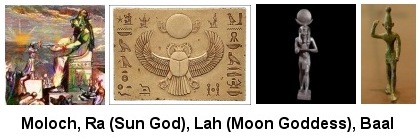LESSON 1
The Fall of the Southern Kingdom
Glad you decided to join us for our next study. As I stated before, following the death of Solomon, the Nation of Israel was divided into the Northern Kingdom, called Israel and the Southern Kingdom, called Judah. Henceforth I will refer to the Southern Kingdom as Judah. The Northern Kingdom fell because of idolatry to the Assyrians in 721 BC. At that time Hezekiah was king over Judah. God allowed Assyria to take the Northern Kingdom because of their idolatry. Their first king, Jeroboam I set up the golden calves at Dan and Bethel for his people to worship. Not one of the following kings tore down these idols nor discouraged the people from worshiping them. All of the kings of the Northern Kingdom were considered bad kings because of this idolatry. Hezekiah was king over Judah when the Northern Kingdom fell. Judah had several kings who were considered to be good kings because they would get rid of the places where the people worshiped idols and encourage worship of Jehovah God only. Hezekiah was one of these good kings. The scriptures for this lesson come from 2 Kings chapters 18-19.
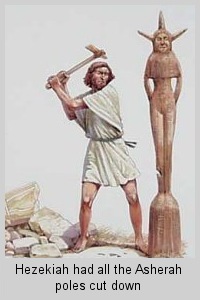 [2 Kings 18:1-5] In the third year of Hoshea son of Elah king of Israel, Hezekiah son of Ahaz king of Judah began to reign. He was twenty-five years old when he became king, and he reigned in Jerusalem twenty-nineyears. His mother’s name was Abijah daughter of Zechariah. He did what was right in the eyes of the Lord, just as his father David had done.
[2 Kings 18:1-5] In the third year of Hoshea son of Elah king of Israel, Hezekiah son of Ahaz king of Judah began to reign. He was twenty-five years old when he became king, and he reigned in Jerusalem twenty-nineyears. His mother’s name was Abijah daughter of Zechariah. He did what was right in the eyes of the Lord, just as his father David had done.
There are a few things I would like to say about these verses. Notice that it gives his mother’s name. These kings had multiple wives and the mothers had a great deal to do with the raising of their sons. His mother was the daughter of Zechariah who was a High Priest. I am sure he was raised worshiping God and being taught that idol worship was against God’s laws. Another thing, David was given as Hezekiah’s father. He was indeed his grandfather 14 generations back. This is not uncommon in Bible passages to call a man son of when it may be several generations back.
[2 Kings 18:4-6] He removed the high places, smashed the sacred stones and cut down the Asherah poles. He broke into pieces the bronze snake Moses had made, for up to that time the Israelites had been burning incense to it. (It was called Nehushtan.) Hezekiah trusted in the Lord, the God of Israel, There was no one like him among all the kings of Judah, either before him or after him. He held fast to the Lord and did not cease to follow him; he kept the commands the Lord had given Moses.
The high places, sacred stones and Asherah poles are all places where the people would go to worship idols. Asherah was a part of Baal worship. These are all fertility gods. The bronze snake was made while the Israelites were wondering in the wilderness. They became restless, tired of wondering, tired of not having enough water, tired of eating manna so they complained and God sent piousness snakes to bite them and many died. Then they cried to Moses to save them. So this bronze snake was made and if they looked on it they would not die. After that they made an idol out of it and worshiped it. [See Numbers 21:5-9]
In King Hezekiah’s fourth year, which was the seventh year of Hoshea son of Elah king of Israel, Shalmaneser king of Assyria marched against Samaria and laid siege to it. At the end of three years the Assyrians took it. So Samaria was captured in Hezekiah’s sixth year, which was the ninth year of Hoshea king of Israel. The king of Assyria deported Israel to Assyria and settled them in Halah, in Gozan on the Habor River and in the towns of the Medes. This happened because they had not obeyed the Lord their God, but had violated His covenant – all that Moses the servant of the Lord commanded. They neither listened to the commands nor carried the out. [2 Kings 18: 9-12]
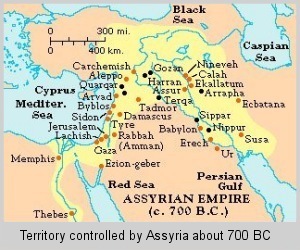 Samaria was the capital city of the Northern Kingdom. It tells us it took the Assyrians 3 years to take the city. Ancient Samaria is now called the West Bank in modern day Jordan. It tells us here that Assyria took many captives out of Israel and relocated them in cities under Assyrian control. Assyria was one of the early nations to practice the relocating of captives. They chose the educated people, any who might claim rights to the throne, any who might become leaders and try to overthrow Assyrian rule. They left the farmers, shepherds and those who would keep the agriculture going and brought in Assyrian leaders and military commanders to control the people and protect their interests.
Samaria was the capital city of the Northern Kingdom. It tells us it took the Assyrians 3 years to take the city. Ancient Samaria is now called the West Bank in modern day Jordan. It tells us here that Assyria took many captives out of Israel and relocated them in cities under Assyrian control. Assyria was one of the early nations to practice the relocating of captives. They chose the educated people, any who might claim rights to the throne, any who might become leaders and try to overthrow Assyrian rule. They left the farmers, shepherds and those who would keep the agriculture going and brought in Assyrian leaders and military commanders to control the people and protect their interests.
About ten years after the fall of the Northern Kingdom, Assyria came after Judah. Sennacherib, King of Assyria captured the larger fortified cities in Judah. Before, Hezekiah had refused to pay tribute to Assyria. It was a custom for aggressive nations to approach another nation with an ultimatum that if they did not pay a yearly fee or tribute in gold, silver or agricultural products then the aggressor would go to war against them. This time Sennacherib sent messengers to Jerusalem telling Hezekiah he had to pay tribute and then they would leave him in peace. Hezekiah chose to pay tribute to Assyria rather than go to war. Hezekiah paid Assyria 300 talents of silver and 30 talents of gold. A talent was about 60 pounds weight. At today’s price for gold that would be approximately $48, 096,000.00 for the gold alone. An expensive payoff!
But Sennacherib took the tribute and prepared to laid siege on Jerusalem anyway. [See 2 Kings 18:17-37] His leaders called out to the people to not trust Hezekiah, not trust their God, he could not save them. He were not as powerful as Assyria.
Hezekiah went into mourning and he sent the palace administrator, secretary and leading priests to Isaiah the prophet to seek God’s help.
[2 Kings 19:5-7] When King Hezekiah’s officials came to Isaiah, Isaiah said to them, “Tell your master, ‘This is what the Lord says: Do not be afraid of what you have heard-those words with which the underlings of the king of Assyria have blasphemed me. Listen! I am going to put such a spirit in him that when he hears a certain report, he will return to his own country, and there I will have him cut down with the sword.’”
True to God’s word, Sennacherib received a report that the King of Egypt was coming to fight against him. So he gets excited and sends messengers with a letter to Hezekiah bragging that Israel’s God cannot protect them. Assyria has already taken many large cities and they will take Jerusalem too, trying to get Hezekiah to surrender. But Hezekiah is depending on God.
[2 Kings 19:14-19] Hezekiah received the letter from the messengers and read it. Then he went up to the temple of the Lord and spread it before the Lord. And Hezekiah prayed to the Lord: “O Lord, God of Israel, enthroned between the cherubim, you alone are God over all the kingdoms of the earth. You have made heaven and earth. Give ear, O Lord, and hear; open your eyes, O Lord, and see; listen to the words Sennacherib has sent to insult the living God. It is true, O Lord, that the Assyrian kings have laid waste to these nations and their lands. They have thrown their gods into the fire and destroyed them, for they were not gods but only wood and stone, fashioned by man’s hands. Now, O Lord our God, deliver us from his hand, so that all kingdoms on earth may know that you alone, O Lord are God.
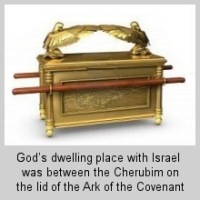 The words “enthroned between the cherubim, refers to the Ark of the Covenant that is covered with gold and has two cherubim, angels, with wings stretched across the top. This is the dwelling place of God with the Nation of Israel.
The words “enthroned between the cherubim, refers to the Ark of the Covenant that is covered with gold and has two cherubim, angels, with wings stretched across the top. This is the dwelling place of God with the Nation of Israel.
“They have thrown their gods into the fire and destroyed them” refers to the gods of these cities that the Assyrians have taken. The nations had a national god, they had nature gods. The cities had their own personal god or gods.
[2 Kings 19:20-21] Then Isaiah son of Amoz sent a message to Hezekiah: “This is what the Lord, the God of Israel, says: I have heard your prayer concerning Sennacherib king of Assyria. [Go to your Bible and read 2 Kings 19: 21-31]
[2 Kings 19:32-36] Therefore this is what the Lord says concerning the king of Assyria: “He will not enter this city or shoot an arrow here. He will not come before it with shield or build a siege ramp against it. By the way that he came he will return; he will not enter this city, declares the Lord. I will defend this city and save it, for my sake and for the sake of David my servant.”
God assures Hezekiah that the Assyrian king will not attack Jerusalem, God Himself will defend the city for David’s sake. God made a covenant with David found in 2 Samuel chapter 7.
[2 Samuel 7:16] “Your house and your kingdom will endure forever before me; your throne will be established forever.”
This covenant is fulfilled by Jesus Christ, descendant of David who reigns as the eternal king forever.
[2 Kings 19:35-37] That night the angel of the Lord went out and put to death a hundred and eighty-five thousand men in the Assyrian camp. When the people got up the next morning—there were all the dead bodies! So Sennacherib king of Assyria broke camp and withdrew. He returned to Nineveh and stayed there. One day, while he was worshiping in the temple of his god Nisroch, his sons Adrammelech and Sharezer cut him down with the sword, and they escaped to the land of Ararat. And Eserhaddon his son succeeded him as king.
God fulfilled his promise to Hezekiah that the Assyrians would not attach Jerusalem and that He would defend the city Himself. His angel killed 185,000 Assyrian soldiers. What do you suppose the Assyrians thought about Judah’s God when they woke up and found all their comrades dead? Sennacherib got up and headed for home! He had had enough of Judah’s God.
God’s word through Isaiah the prophet that Sennacherib would return to his own country and be cut down with the sword had come to pass. The promises of God always come to pass!
LESSON 2
Scripture passages for this study are taken from: 2 Kings 20; 2 Chronicles 32:24-29; Isaiah 38. Hezekiah is a good man and a good king over Judah. He followed God’s laws, tore down the idols and idol worship places in the kingdom and God has blessed him. After the Lord saved Hezekiah and Jerusalem from the Assyrian army by killing 185,000 men in one night, Hezekiah was highly respected by the all the nations. God continued to bless him and he gained great riches.
[2Ch 32: 27-30] Hezekiah had very great riches and honor, and he made treasuries for his silver and gold and for his precious stones, spices, shields and all kinds of valuables. He also made buildings to store the harvest of grain, new wine and oil; and he made stalls for various kinds of cattle, and pens for the flocks. He built villages and acquired great numbers of flocks and herds, for God had given him very great riches. It was Hezekiah who blocked the upper outlet of the Gihon spring and channeled the water down to the west side of the City of David. He succeeded in everything he undertook.
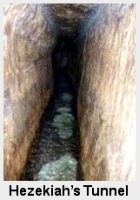 God had given Hezekiah everything, power, wealth, a good reputation, security from his enemies. But Hezekiah was human and he became prideful about his possessions. He was like we are today. God blesses us with jobs, good income, families and even some of us with wealth. We say, “look what I have done.” We forget that all blessings come from the Lord and He can very quickly take them away if we fail to use our wealth wisely and fail to give Him the credit.
God had given Hezekiah everything, power, wealth, a good reputation, security from his enemies. But Hezekiah was human and he became prideful about his possessions. He was like we are today. God blesses us with jobs, good income, families and even some of us with wealth. We say, “look what I have done.” We forget that all blessings come from the Lord and He can very quickly take them away if we fail to use our wealth wisely and fail to give Him the credit.
[2Ch 32:25-26] But Hezekiah’s heart was proud and he did not respond to the kindness shown him; therefore the Lord’s wrath was on him and on Judah and Jerusalem.
So God acts to get Hezekiah’s attention. Like in the story of Jonah where God let him stay in the belly of the great fish for three days to get Jonah’s attention, God brings Hezekiah to the point of death to humble him.
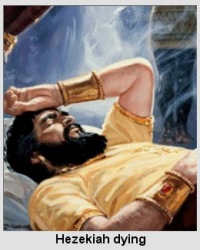 [2 Kings 20:1-3] In those days Hezekiah became ill and was at the point of death. The prophet Isaiah son of Amoz went to him and said: “This is what the Lord says: Put your house in order, because you are going to die; you will not recover.” Hezekiah turned his face to the wall and prayed to the Lord, “Remember, O Lord, how I have walked before you faithfully and with wholehearted devotion and have done what is good in your eyes.” And Hezekiah wept bitterly.
[2 Kings 20:1-3] In those days Hezekiah became ill and was at the point of death. The prophet Isaiah son of Amoz went to him and said: “This is what the Lord says: Put your house in order, because you are going to die; you will not recover.” Hezekiah turned his face to the wall and prayed to the Lord, “Remember, O Lord, how I have walked before you faithfully and with wholehearted devotion and have done what is good in your eyes.” And Hezekiah wept bitterly.
God is telling Hezekiah to make his last will and testament, tell his family goodbye, put his house in order because he is going to die. Hezekiah is not ready to die. God now has his attention. He humbles himself before God and cries out for God to save him.
I think when a person has a terminal illness and knows that they are going to die, it changes the way they see life and this world. It brings the most important things to focus: their relationship to the Lord, to be sure they have been saved and are ready and assured of eternal life in heaven; their relationship to the members of their families and friends, concerned about their spiritual condition; deciding what to do with the worldly possessions with which God has blessed them; putting their worldly affairs in order.
In truth, we should live our lives everyday with this mindset because we never know whether we can count on tomorrow. Whether you are going to spend eternity in heaven or hell is not a decision that should be put off.
[2 Kings 20:4-6] Before Isaiah had left the middle court, the word of the Lord came to him: “Go back and tell Hezekiah, the leader of my people, ‘This is what the Lord, the God of your father David, says: I have heard your prayer and seen your tears; I will heal you. On the third day from now you will go up to the temple of the Lord. I will add fifteen years to your life.
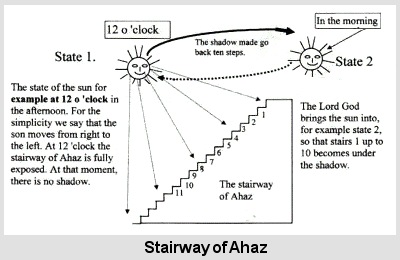 God heard Hezekiah’s sincere prayers and agrees to give him another fifteen years to live. Apparently Hezekiah had some kind of boil or maybe a cancer because Isaiah told him to put a poultice of figs on it and it would heal. A good thing to remember; a fig poultice. Now Hezekiah asks for a sign, a miracle, something that could not naturally happen, to prove that God would really heal him. This sounds like a lack of faith to me, but God honored his his request.
God heard Hezekiah’s sincere prayers and agrees to give him another fifteen years to live. Apparently Hezekiah had some kind of boil or maybe a cancer because Isaiah told him to put a poultice of figs on it and it would heal. A good thing to remember; a fig poultice. Now Hezekiah asks for a sign, a miracle, something that could not naturally happen, to prove that God would really heal him. This sounds like a lack of faith to me, but God honored his his request.
[2 Kings 20:8-11] Hezekiah had asked Isaiah, “What will be the sign that the Lord will heal me and that I will go up to the temple of the Lord on the third day from now?” Isaiah answered, “This is the Lord’s sign to you that the Lord will do what he has promised: Shall the shadow go forward ten steps, or shall it go back ten steps:” “It is a simple matter for the shadow to go forward ten steps,” said Hezekiah. “Rather, have it go back ten steps.” Then the prophet Isaiah called upon the Lord, and the Lord made the shadow go back the ten steps it had gone down on the stairway of Ahaz.
Through Isaiah the prophet God offers Hezekiah a choice for his sign, move time forward or move it backward. Hezekiah reasons that it is harder for time to go backward so this is his choice. How much time is involved with the shadow moving 10 steps back on Ahaz’s stairway? Did this really happen?
[2 Kings 20:11] Then the prophet Isaiah called upon the Lord, and the Lord made the shadow go back the ten steps it had gone down on the stairway of Ahaz.
God, the God of creation made time go backward to fulfill His promise to Hezekiah and prove to him that he would live another fifteen years. God is always true to His promises. Man—not so good. How long did time go backward? I don’t know, but I believe that it did.
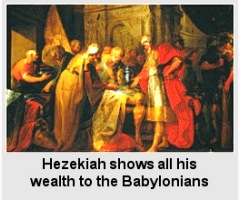 [2 Kings 20: 12-18] At that time Merodach-Baladan son of Baladan king of Babylon sent Hezekiah letters and a gift, because he had heard of Hezekiah’s illness. Hezekiah received the envoys and showed them all that was in his storehouses—the silver, the gold, the spices and the fine olive oil—his armory and everything found among his treasures. There was nothing in his palace or in all his kingdom that Hezekiah did not show them. Then Isaiah the prophet went to King Hezekiah and asked, “What did those men say, and where did they come from?” “From a distant land,” Hezekiah replied. “They came from Babylon.” The prophet asked, “What did they see in your palace?” “They saw everything in my palace,” Hezekiah said. “There is nothing among my treasures that I did not show them.” Then Isaiah said to Hezekiah, “Hear the word of the Lord: The time will surely come when everything in your palace, and all that your predecessors have stored up until this day, will be carried off to Babylon. Nothing will be left, says the Lord. And some of your descendants, your own flesh and blood who will be born to you, will be taken away, and they will become eunuchs in the palace of the king of Babylon.”
[2 Kings 20: 12-18] At that time Merodach-Baladan son of Baladan king of Babylon sent Hezekiah letters and a gift, because he had heard of Hezekiah’s illness. Hezekiah received the envoys and showed them all that was in his storehouses—the silver, the gold, the spices and the fine olive oil—his armory and everything found among his treasures. There was nothing in his palace or in all his kingdom that Hezekiah did not show them. Then Isaiah the prophet went to King Hezekiah and asked, “What did those men say, and where did they come from?” “From a distant land,” Hezekiah replied. “They came from Babylon.” The prophet asked, “What did they see in your palace?” “They saw everything in my palace,” Hezekiah said. “There is nothing among my treasures that I did not show them.” Then Isaiah said to Hezekiah, “Hear the word of the Lord: The time will surely come when everything in your palace, and all that your predecessors have stored up until this day, will be carried off to Babylon. Nothing will be left, says the Lord. And some of your descendants, your own flesh and blood who will be born to you, will be taken away, and they will become eunuchs in the palace of the king of Babylon.”
Hezekiah, out of pride displayed all his wealth and that of Judah to the visitors from Babylon. Isaiah tells him that in the future the Babylonians will come and take all his wealth and treasure, even his descendants off as captives. Some of his grandchildren will be made eunuchs in the palace of the King of Babylon. One of these descendants will be Daniel. Hezekiah’s response? “Well at least there will be peace and security in my lifetime.” Here is a man who worshiped God and was faithful to all His commandments in his youth. Then after he was greatly blessed by God with power and wealth became prideful, self-centered, unconcerned about the future of his people, even his own family. Sounds like today, doesn’t it? Jesus said in Matthew 19:24: “Again I tell you, it is easier for a camel to go through the eye of a needle than for a rich man to enter the kingdom of God.”
Next week, Judah gets a new king, a very bad king.
LESSON 3
Scripture for this lesson is taken from 2 Kings (chapters 20-21). 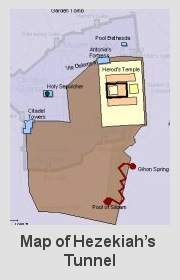 Hi there, I am glad that you have joined us for our next lesson in the Fall of Judah. In last week’s lesson King Hezekiah was visited by men from Babylon bearing letters and gifts from King Merodach-Baladan. Hezekiah received the messengers and proceeded to show them all the treasures of Judah. Isaiah came to Hezekiah and told him that the Lord had said the Babylonians would come and take all of Jerusalem’s treasures and would take his descendants as captive and make them eunuchs in the king’s palace, but not in Hezekiah’s lifetime.
Hi there, I am glad that you have joined us for our next lesson in the Fall of Judah. In last week’s lesson King Hezekiah was visited by men from Babylon bearing letters and gifts from King Merodach-Baladan. Hezekiah received the messengers and proceeded to show them all the treasures of Judah. Isaiah came to Hezekiah and told him that the Lord had said the Babylonians would come and take all of Jerusalem’s treasures and would take his descendants as captive and make them eunuchs in the king’s palace, but not in Hezekiah’s lifetime.
[2 Kings 20:20-21] (20) As for the other events of Hezekiah’s reign, all his achievements and how he made the pool and the tunnel by which he brought water into the city, are they not written in the book of the annals of the kings of Judah? (21) Hezekiah rested with his ancestors. And Manasseh his son succeeded him as king.
Twenty years after the fall of the Northern Kingdom, Hezekiah walled up the Gihon Spring which was Jerusalem’s main water supply so that Assyria could not shut off water to the city. He had a tunnel built from the spring down to the Pool of Siloam, a distance of 1750 feet. He had two crews working, one from each end and they met in the middle. This was a good engineering job for 701 BC. Hezekiah died and was succeeded by his twelve year old son, Manasseh.
[2 Kings 21:1-6] (1) Manasseh was twelve years old when he became king, and he reigned in Jerusalem fifty-five years. His mother’s name was Hephzibah. (2) He did evil in the eyes of the Lord, following the detestable practices of the nations the Lord had driven out before the Israelites. (3) He rebuilt the high places his father Hezekiah had destroyed; he also erected altars to Baal and made an Asherah pole, as Ahab king of Israel had done. He bowed down to all the starry hosts and worshiped them. (4) He built altars in the temple of the Lord, of which the Lord had said, “In Jerusalem I will put my Name.” (5) In the two courts of the temple of the Lord, he built altars to all the starry hosts. (6) He sacrificed his own son in the fire, practiced divination, sought omens, and consulted mediums and spiritists. He did much evil in the eyes of the Lord, arousing his anger.
Manasseh rebuilt all the idols that his father, Hezekiah had destroyed. He made idols of the moon god lah, the sun god ra, the baal gods, male god, Baal, the female Asherah. He also built altars to Moloch who was a god of the Ammonites, the Canaanites and the Phoenicians. Moloch worship required child sacrifice. He went to fortune tellers and practiced some witchcraft. In the 10 Commandments, God said, “Thou shalt have no other gods before me.” When the Israelites came into the Promised Land God told them not to marry any pagan women and to destroy all the people who were living in the land of Canaan. These rules were to prevent them from worshiping the pagan idols. But they did not do what God commanded. Here are some of the gods worshiped by the people in Judah at that time.
There were other pagan gods worshiped by the people of Judah at this time. These are just a few that were mentioned in the scripture. [2 Kings 21:3-5]
[2 Kings 21:10-15] (10) The Lord said through his servants the prophets: (11) “Manasseh king of Judah has committed these detestable sins. He has done more evil than the Amorites who preceded him and has led Judah into sin with his idols. (12) Therefore this is what the Lord, the God of Israel, says: I am going to bring such disaster on Jerusalem and Judah that the ears of everyone who hears of it will tingle. (13) I will stretch out over Jerusalem the measuring line used against Samaria and the plumb line used against the house of Ahab. I will wipe out Jerusalem as one wipes a dish, wiping it and turning it upside down. (14) I will forsake the remnant of my inheritance and give them into the hands of enemies. They will be looted and plundered by all their enemies; (15) they have done evil in my eyes and have aroused my anger from the day their ancestors came out of Egypt until this day.”
God is clearly losing patience with His chosen people. God will not tolerate idol worship forever. He is going to judge Judah on the same grounds He judged Samaria (Northern Kingdom), and the family of Ahab (Ahab and Jezebel) who was king of Samaria.
[2 Kings 10:6-11] (6) Then Jehu wrote them a second letter, saying, “If you are on my side and will obey me, take the heads of your master’s sons and come to me in Jezreel by this time tomorrow. ”Now the royal princes, seventy of them, were with the leading men of the city, who were rearing them. (7) When the letter arrived, these men took the princes and slaughtered all seventy of them. They put their heads in baskets and sent them to Jehu in Jezreel. (8) When the messenger arrived, he told Jehu, “They have brought the heads of the princes ”Then Jehu ordered, “Put them in two piles at the entrance of the city gate until morning.” (9) The next morning Jehu went out. He stood before all the people and said, “You are innocent. It was I who conspired against my master and killed him, but who killed all these? (10 Know, then, that not a word the Lord has spoken against the house of Ahab will fail. The Lord has done what he announced through his servant Elijah.” (11) So Jehu killed everyone in Jezreel who remained of the house of Ahab, as well as all his chief men, his close friends and his priests, leaving him no survivor.
God allowed the Assyrians to bring His judgment upon Samaria (Northern Kingdom) and He used Jehu to bring judgment upon the family of Ahab. His is going to use the Babylonians to bring judgement upon the Kingdom of Judah. Will God bring judgment against America for idol worship? You decide.
[2 Kings 21: 17-18] (17) As for the other events of Manasseh’s reign, and all he did, including the sin he committed, are they not written in the book of the annals of the kings of Judah? (18) Manasseh rested with his ancestors and was buried in his palace garden, the garden of Uzza. And Amon his son succeeded him as king.
Amon did evil in the Lord’s eyes and he reigned only two years over Judah. He was assassinated in his palace by his own officials and his eight-year old son, Josiah reigned in his place.
Next week we will study about good King Josiah, the boy king.
LESSON 4
Scripture text for this lesson will be taken from: 2Kings: 22-23 and 2Chronicles: 34-35. Last week in lesson 3, Hezekiah’s son, Manasseh reigned over Judah for 55 years. He was a bad king because he worshiped the idols of the nations around Judah. When Manasseh died, his 8 year old son, Josiah became king. His mother was Jedidah. “He did what was right in the eyes of the Lord and walked in all the ways of his father David, not turning aside to the right or to the left.” 2Kings 22: 2. Here is another instance of a man being referred to as the son of David, when actually he was David’s grandson 14 generations forward. Josiah’s mother was Jedidah which means beloved of Jehovah.
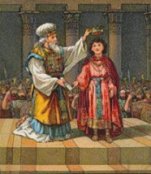
[2 Kings 22: 1-7] (1)Josiah was eight years old when he became king, and he reigned in Jerusalem thirty-one years. His mother’s name was Jedidah daughter of Adaiah; she was from Bozkath. (2) He did what was right in the eyes of the Lord and followed completely the ways of his father David, not turning aside to the right or to the left. (3) In the eighth year of his reign, while he was still young, he began to seek the God of his father David. In his twelfth year he began to purge Judah and Jerusalem of high places, Asherah poles and idols.(4) Under his direction the altars of the Baals were torn down; he cut to pieces the incense altars that were above them, and smashed the Asherah poles and the idols. These he broke to pieces and scattered over the graves of those who had sacrificed to them. (5) He burned the bones of the priests on their altars, and so he purged Judah and Jerusalem. (6) In the towns of Manasseh, Ephraim and Simeon, as far as Naphtali, and in the ruins around them, (7) he tore down the altars and the Asherah poles and crushed the idols to powder and cut to pieces all the incense altars throughout Israel. Then he went back to Jerusalem.
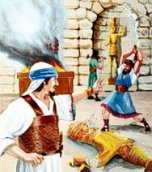
When King Josiah was 16 years old, he began to worship the Lord God. When he was 18 he went on a crusade throughout Judah and north into what was the Northern Kingdom, but in Josiah’s time belonged to Assyria, destroying, idols. He even burned the bones of the priests who worshiped these idols on the idol altars and scattered their ashes over the idol ruins. He purged the land of the idols and their worship leaders.
It has been 57 years since the death of Hezekiah. In the 55 year reign of Manasseh, the temple had been adapted for the worship of idols. The idol worshiping priests even had special rooms in the temple. Josiah had all this taken out of the temple, cleaned and repairs made so that it would be used only for the worship of Jehovah. While the repairs were being made, the High Priest, Hilkiah, found the Book of the Law which had been lost for a long time. Many Bibical scholars believe that the book found was the scroll of Deuteronomy while others believe that it was the first five books of the Bible called “The Law.” Whichever it was, it contained God’s Word giving the Ten Commandments, the religious feasts they were to keep each year, the Sabbath years, the Year of Jubilee, the laws concerning God’s judgment upon the people if they did not keep His laws.
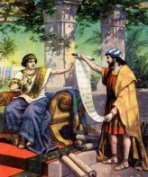
[2 Kings 22:10-13] (10) Then Shaphan the secretary informed the king, “Hilkiah the priest has given me a book.” And Shaphan read from it in the presence of the king. (11) When the king heard the words of the Book of the Law, he tore his robes. (12) He gave these orders to Hilkiah the priest, Ahikam son of Shaphan, Akbor son of Micaiah, Shaphan the secretary and Asaiah the king’s attendant: (13) “Go and inquire of the Lord for me and for the people and for all Judah about what is written in this book that has been found. Great is the Lord’s anger that burns against us because those who have gone before us have not obeyed the words of this book; they have not acted in accordance with all that is written there concerning us.”
After hearing the book read, King Josiah knew that they were in big trouble with God. He was concerned for the nation and for his people. Josiah was a good leader and he wanted to put his people back to worshiping God. Leaders in our world today need to be concerned for the people and seek God’s help in knowing what His will is for our countries today. This applies to the pastors of our churches and the men where are supposed to be the leaders in our homes.
[2 Kings 22:14] Hilkiah the priest, Ahikam, Akbor, Shaphan and Asaiah went to speak to the prophet Huldah, who was the wife of Shallum son of Tikvah, the son of Harhas, keeper of the wardrobe. She lived in Jerusalem, in the New Quarter.
Josiah sent his religious leaders and trusted officials to visit the prophetess, Huldah, who lived in Jerusalem to ask her to see what the Lord said that they must do to avoid God’s judgment. There are several women prophetesses and judges in the Bible.
[2 Kings 22:15-20] (15) She said to them, “This is what the Lord, the God of Israel, says: Tell the man who sent you to me, (16) ‘This is what the Lord says: I am going to bring disaster on this place and its people, according to everything written in the book the king of Judah has read. (17) Because they have forsaken me and burned incense to other gods and aroused my anger by all the idols their hands have made, my anger will burn against this place and will not be quenched.’ (18) Tell the king of Judah, who sent you to inquire of the Lord, ‘This is what the Lord, the God of Israel, says concerning the words you heard: (19) Because your heart was responsive and you humbled yourself before the Lord when you heard what I have spoken against this place and its people—that they would become a curse and be laid waste — and because you tore your robes and wept in my presence, I also have heard you, declares the Lord. (20) Therefore I will gather you to your ancestors, and you will be buried in peace. Your eyes will not see all the disaster I am going to bring on this place.’” So they took her answer back to the king.
The Lord relayed through the prophetess God’s message that His judgment is coming upon Judah because of the idol worship. But because Josiah had humbled himself and had honestly sought God’s will, and would lead his people back to God, this judgment would not come in his lifetime.
[Exodus 20:3] “Thou shalt have no other gods before me.”
The message for us? Put away your idols, turn your hearts to the Lord and follow His way! God has not changed, He still will not tolerate idol worship!
LESSON 5
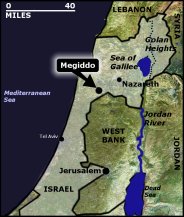 Scriptures for this lesson are taken from: 2 Chronicles 36, Daniel 1, 2 Kings 24 and Jeremiah 25. In Lesson 4, God promised King Josiah that Jerusalem would not be destroyed in his lifetime. In lesson 5 we will study the death of King Josiah, and the failure of his sons to follow God as the Kingdom of Judah is taken by the Babylonians.
Scriptures for this lesson are taken from: 2 Chronicles 36, Daniel 1, 2 Kings 24 and Jeremiah 25. In Lesson 4, God promised King Josiah that Jerusalem would not be destroyed in his lifetime. In lesson 5 we will study the death of King Josiah, and the failure of his sons to follow God as the Kingdom of Judah is taken by the Babylonians.
[2 Chronicles 36: 20-24] (20) After all this, when Josiah had set the temple in order, Necho king of Egypt went up to fight at Carchemish on the Euphrates, and Josiah marched out to meet him in battle. (21) But Necho sent messengers to him, saying, “What quarrel is there, king of Judah, between you and me? It is not you I am attacking at this time, but the house with which I am at war. God has told me to hurry; so stop opposing God, who is with me, or he will destroy you.” (22) Josiah, however, would not turn away from him, but disguised himself to engage him in battle. He would not listen to what Necho had said at God’s command but went to fight him on the plain of Megiddo. (23) Archers shot King Josiah, and he told his officers, “Take me away; I am badly wounded.” (24) So they took him out of his chariot, put him in his other chariot and brought him to Jerusalem, where he died. He was buried in the tombs of his ancestors, and all Judah and Jerusalem mourned for him.
At this time, King Josiah was paying tribute (taxes) to the Assyrians. God is using the Babylonians to weaken and destroy Assyria. Necho, Pharoah of Egypt is also at war with Assyria. Being a vassal of Assyria, Josiah felt it his duty to fight with Assyria against Egypt so he took his army to Megiddo where he was mortally wounded. Following Josiah’s death, his son, Jehoahaz was made king over Judah.
[2 Chronicles 36:1-3] (1) And the people of the land took Jehoahaz son of Josiah and made him king in Jerusalem in place of his father. (2) Jehoahaz was twenty-three years old when he became king, and he reigned in Jerusalem three months. (3) The king of Egypt dethroned him in Jerusalem and imposed on Judah a levy of a hundred talents of silver and a talent of gold. (4) The king of Egypt made Eliakim, a brother of Jehoahaz, king over Judah and Jerusalem and changed Eliakim’s name to Jehoiakim. But Necho took Eliakim’s brother Jehoahaz and carried him off to Egypt.
Following the death of Josiah, Egypt is controlling events in Judah. After only three months on the throne, Egypt replaced Jehoahaz with his brother Eliakim and renamed him Jehoiakim. They have levied a heavy tax of one hundred talents of silver and one talent of gold to be paid by the people of Judah to Egypt. A talent weighed about 60 pounds. So you have 6,000 pounds of silver and 60 pounds of gold. They also have taken Jehoahaz captive into Egypt. After this Egypt had no control over political events in Judah.
[2Kings 24:7] 7 The king of Egypt did not march out from his own country again, because the king of Babylon had taken all his territory, from the Wadi of Egypt to the Euphrates River.
[2Chronicles 36:5-7] (5) Jehoiakim was twenty-five years old when he became king, and he reigned in Jerusalem eleven years. He did evil in the eyes of the Lord his God. (6) Nebuchadnezzar king of Babylon attacked him and bound him with bronze shackles to take him to Babylon. (7) Nebuchadnezzar also took to Babylon articles from the temple of the Lord and put them in his temple there. (8) The other events of Jehoiakim’s reign, the detestable things he did and all that was found against him, are written in the book of the kings of Israel and Judah. And Jehoiachin his son succeeded him as king.
 Nebuchadnezzar, the King of Babylon has conquered Jehoiakim of Judah. The year is 606 B.C. He has taken the temple treasures, golden bowels and goblets, etc. that were used in the worship of Jehovah as well as young princes of Judah including Daniel. Jerusalem is conquered by Babylon at this time but not destroyed.
Nebuchadnezzar, the King of Babylon has conquered Jehoiakim of Judah. The year is 606 B.C. He has taken the temple treasures, golden bowels and goblets, etc. that were used in the worship of Jehovah as well as young princes of Judah including Daniel. Jerusalem is conquered by Babylon at this time but not destroyed.
[Daniel 1:1-2] (1) In the third year of the reign of Jehoiakim king of Judah, Nebuchadnezzar king of Babylon came to Jerusalem and besieged it. (2) And the Lord delivered Jehoiakim king of Judah into his hand, along with some of the articles from the temple of God. These he carried off to the temple of his god in Babylon and put in the treasure house of his god.
Nine years later in 597 B.C. Nebuchadnezzar took more treasures, he took King Jehoiachin and 10,000 leaders in Judah, princes, officers, leaders of the country captive to Babylon.
[2 Kings 24:10-16] (10) At that time the officers of Nebuchadnezzar king of Babylon advanced on Jerusalem and laid siege to it, (11) and Nebuchadnezzar himself came up to the city while his officers were besieging it. (12) Jehoiachin king of Judah, his mother, his attendants, his nobles and his officials all surrendered to him. In the eighth year of the reign of the king of Babylon, he took Jehoiachin prisoner. (13) As the Lord had declared, Nebuchadnezzar removed the treasures from the temple of the Lord and from the royal palace, and cut up the gold articles that Solomon king of Israel had made for the temple of the Lord. (14) He carried all Jerusalem into exile: all the officers and fighting men, and all the skilled workers and artisans — a total of ten thousand. Only the poorest people of the land were left. (15) Nebuchadnezzar took Jehoiachin captive to Babylon. He also took from Jerusalem to Babylon the king’s mother, his wives, his officials and the prominent people of the land. (16) The king of Babylon also deported to Babylon the entire force of seven thousand fighting men, strong and fit for war, and a thousand skilled workers and artisans. (17) He made Mattaniah, Jehoiachin’s uncle, king in his place and changed his name to Zedekiah.
Nebuchadnezzar has now taken from Jerusalem anyone who could lead the people in revolt against Babylon. He has taken the leaders, prominent people and a large army of fighting men.
But he still has not destroyed the city. He has left Jehoiachin’s uncle to be king and changed his name to Zedekiah. But during this time following the death of Josiah, God sent his prophet Jeremiah to prophecy in Jerusalem that He would destroy the city and the nation if they did not repent and follow him.
But he still has not destroyed the city. He has left Jehoiachin’s uncle to be king and changed his name to Zedekiah. During all this time following the death of Josiah, God had his prophet, Jeremiah in Jerusalem telling the people that God would destroy Jerusalem and drive His people into exile if they did not repent of their idolatry and follow His laws.
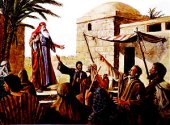 [Jeremiah 25:8-11] (8) Therefore the Lord Almighty says this: “Because you have not listened to my words, (9) I will summon all the peoples of the north and my servant Nebuchadnezzar king of Babylon,” declares the Lord, “and I will bring them against this land and its inhabitants and against all the surrounding nations. I will completely destroy them and make them an object of horror and scorn, and an everlasting ruin. (10) I will banish from them the sounds of joy and gladness, the voices of bride and bridegroom, the sound of millstones and the light of the lamp. (11) This whole country will become a desolate wasteland, and these nations will serve the king of Babylon seventy years.
[Jeremiah 25:8-11] (8) Therefore the Lord Almighty says this: “Because you have not listened to my words, (9) I will summon all the peoples of the north and my servant Nebuchadnezzar king of Babylon,” declares the Lord, “and I will bring them against this land and its inhabitants and against all the surrounding nations. I will completely destroy them and make them an object of horror and scorn, and an everlasting ruin. (10) I will banish from them the sounds of joy and gladness, the voices of bride and bridegroom, the sound of millstones and the light of the lamp. (11) This whole country will become a desolate wasteland, and these nations will serve the king of Babylon seventy years.
The people did not listen and continued in their sinful ways. God is not patient forever. He is loving and kind and gives His people every opportunity to be obedient but He does have a limit. How much time do we have left before God sends His punishment?
Next week in Lesson 6 the Babylonians will destroy Jerusalem and the Babylonian captivity will begin.
LESSON 6
Scriptures for this lesson are taken from Jeremiah 25; 2 Chronicles 36; Ezekiel 5; Leviticus 25; 2 Kings 25. At the close of Lesson 5, Nebuchadnezzar had taken thousands of captives to Babylon in 597 BC. Nebuchadnezzar had placed Zedekiah on the throne of Judah. He was required to pay a large tribute each year to Babylon. Ezekiel is prophesying the destruction of Jerusalem from Babylon, Jeremiah is preaching in Jerusalem to the people of Judah to repent of their idol worship and prophesying the destruction of Jerusalem if they don’t. The prophet, Ezekiel was one of the captives taken to Babylon in 597 BC. He was married and lived in the countryside outside of Babylon. He prophesied the destruction of Jerusalem for six years before it fell.
[Ezekiel 5:8-12] 8 “Therefore this is what the Sovereign Lord says: I myself am against you, Jerusalem, and I will inflict punishment on you in the sight of the nations. 9 Because of all your detestable idols, I will do to you what I have never done before and will never do again. 10 Therefore in your midst parents will eat their children, and children will eat their parents. I will inflict punishment on you and will scatter all your survivors to the winds. 11 Therefore as surely as I live, declares the Sovereign Lord, because you have defiled my sanctuary with all your vile images and detestable practices, I myself will shave you; I will not look on you with pity or spare you. 12 A third of your people will die of the plague or perish by famine inside you; a third will fall by the sword outside your walls; and a third I will scatter to the winds and pursue with drawn sword.
While Ezekiel prophesied in Babylon, Jeremiah was prophesying in Jerusalem.
[Jeremiah 25:8-11] 8 Therefore the Lord Almighty says this: “Because you have not listened to my words, 9 I will summon all the peoples of the north and my servant Nebuchadnezzar king of Babylon,” declares the Lord, “and I will bring them against this land and its inhabitants and against all the surrounding nations. I will completely destroy them and make them an object of horror and scorn, and an everlasting ruin. 10 I will banish from them the sounds of joy and gladness, the voices of bride and bridegroom, the sound of millstones and the light of the lamp. 11 This whole country will become a desolate wasteland, and these nations will serve the king of Babylon seventy years.
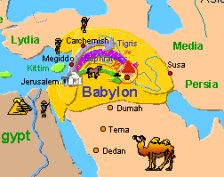
Here in this prophecy Jeremiah gives the exact number of years that the Jews will be held in exile in Babylon. The reason for 70 years is given in 2 Chronicles 36:20-21: 20 He carried into exile to Babylon the remnant, who escaped from the sword, and they became servants to him and his successors until the kingdom of Persia came to power. 21 The land enjoyed its Sabbath rests; all the time of its desolation it rested, until the seventy years were completed in fulfillment of the word of the Lord spoken by Jeremiah.
The Sabbath rests refers to the Law of the Sabbath Year given in Leviticus 25. After the Israelites came into the Promised Land and began to live, there is no record that they kept the Sabbath Years or the Year of Jubilee.
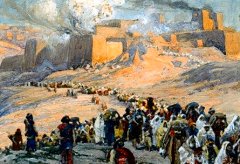
[Leviticus 25: 1-7] The Lord said to Moses at Mount Sinai, 2 “Speak to the Israelites and say to them: ‘When you enter the land I am going to give you, the land itself must observe a Sabbath to the Lord. 3 For six years sow your fields, and for six years prune your vineyards and gather their crops. 4 But in the seventh year the land is to have a year of Sabbath rest, a Sabbath to the Lord. Do not sow your fields or prune your vineyards. 5 Do not reap what grows of itself or harvest the grapes of your untended vines. The land is to have a year of rest. 6 Whatever the land yields during the Sabbath year will be food for you—for yourself, your male and female servants, and the hired worker and temporary resident who live among you, 7 as well as for your livestock and the wild animals in your land. Whatever the land produces may be eaten.
This means that they could plant and harvest crops for 6 years but on the seventh year they could not plant anything. Whatever came up volunteer in the fields could be used. So they had to depend on the Lord to give enough abundance in six years to last seven years. It seems that Israel never had enough faith in God to provide, to observe the Sabbath years. In the Year of Jubilee they were required to let the land rest but also land that tribal members had to sell would be returned to them. This was God’s way of keeping the tribal lands in the hands of the members of each tribe. This was apparently not practiced by Israel ever as far as we know. So during the 70 year exile God’s law concerning rest for the land would be fulfilled. In the following prophesy, Jeremiah gives the reasons for the exile.
[2 Chronicles 36:14-16] 14 Furthermore, all the leaders of the priests and the people became more and more unfaithful, following all the detestable practices of the nations and defiling the temple of the Lord, which he had consecrated in Jerusalem. 15 The Lord, the God of their ancestors, sent word to them through his messengers again and again, because he had pity on his people and on his dwelling place. 16 But they mocked God’s messengers, despised his words and scoffed at his prophets until the wrath of the Lord was aroused against his people and there was no remedy.
Zedekiah was made King over Judah by Nebuchadnezzar the King of Babylon and he reigned 11 years. In the ninth year of his reign he rebelled against Babylon, refusing to pay tribute and Nebuchadnezzar came back to Judah and laid siege again against Jerusalem for 18 months.
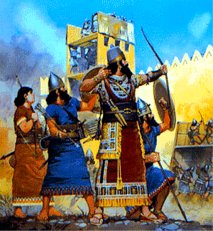
[2 Kings 25:1-7] So in the ninth year of Zedekiah’s reign, on the tenth day of the tenth month, Nebuchadnezzar king of Babylon marched against Jerusalem with his whole army. He encamped outside the city and built siege works all around it.2 The city was kept under siege until the eleventh year of King Zedekiah. 3 By the ninth day of the fourth month the famine in the city had become so severe that there was no food for the people to eat. 4 Then the city wall was broken through, and the whole army fled at night through the gate between the two walls near the king’s garden, though the Babylonians were surrounding the city. They fled toward the Arabah, 5 but the Babylonian army pursued the king and overtook him in the plains of Jericho. All his soldiers were separated from him and scattered, 6 and he was captured. He was taken to the king of Babylon at Riblah, where sentence was pronounced on him. 7 They killed the sons of Zedekiah before his eyes. Then they put out his eyes, bound him with bronze shackles and took him to Babylon.
In 586 BC, Jerusalem fell and many more captives were taken to Babylon. The Kingdom of Israel would be ruled over by other nations from 586 BC until May 14, 1948 when Israel once again became an independent nation. As we move into our study in the Book of Daniel next week, we will be studying about those nations what will rule over Israel.
Israel was established by God as His people. He would be rule over them, lead them and protect them. They were to be a blessing to all other peoples by showing them that God was the only god and what it meant to follow God’s laws. They were to be a teacher of God’s ways to all other people. But Israel failed because they could not be monogamous to God. They were unfaithful by worshiping other gods who were not gods at all. They were also given the privilege of bringing forth the Messiah. God did bring forth the Messiah through a faithful remnant of His people. As we will learn in Daniel, Israel’s mission as a teacher of God’s ways was taken from them and given to the gentiles. That is us. We are living in the age of the gentiles and as Christians it is our responsibility to teach the world about Jesus, the son of God and the Savior for all mankind.
LESSON 7
Scriptures for this lesson are taken from: Exodus 40; 1 Kings 6; 1 Kings 8; Ezekiel 7, 10 & 11.
I said at the end of Lesson 6 that we would go next into the prophesies of Daniel, but I have decided that there is one more subject I need to cover before we start the Book of Daniel.
The people of Israel are God’s chosen people. When they came out of slavery in Egypt into the Sinai desert, God gave them His laws concerning how they were to worship Him; how they were to treat each other and the nations around them; all the laws concerning how they were to live. God would be their leader, their protector, their king.
While Israel was camped at Mt. Sinai, also called Horeb, after the Commandments and laws were given, they began to build the tabernacle, their place of worship, according to God’s instructions. It took one year to complete the tabernacle so it could be used. The Ark of the Covenant that was placed in the Holy of Holies inside the tabernacle was where God dwelt with His people. When the tabernacle was completed and all the furniture placed inside, the High Priest completed all the cleansing rituals, then the Holy Presence of God also called the Shekinah glory, came down to dwell on the top of the ark of the covenant between the cherubim. Shekinah is a Hebrew word that means dwelling or settling.
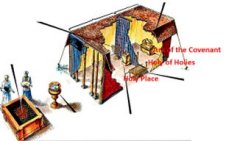
[Exodus 40:34-35] 34 Then the cloud covered the tent of meeting, and the glory of the Lord filled the tabernacle. 35 Moses could not enter the tent of meeting because the cloud had settled on it, and the glory of the Lord filled the tabernacle.
During the 40 years Israel wondered in the wilderness, God’ s presence was seen as a pillar of fire at night and a pillar of smoke in the daytime. While the smoke remained above the tabernacle, Israel stayed where they were, when it rose from the tabernacle they knew it was time to move on.
After the death of King David, Solomon became King of Israel and it was his responsibility to build a temple for God in Jerusalem. From the time the tabernacle was built at Sinai until Solomon began to build the temple in Jerusalem it was about 480 years.
[1 Kings 6:1] In the four hundred and eightieth year after the Israelites came out of Egypt, in the fourth year of Solomon’s reign over Israel, in the month of Ziv, the second month, he began to build the temple of the Lord.
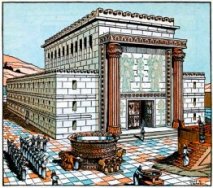
[1 Kings 8:3-10] 3 When all the elders of Israel had arrived, the priests took up the ark, 4 and they brought up the ark of the Lord and the tent of meeting and all the sacred furnishings in it. The priests and Levites carried them up, 5 and King Solomon and the entire assembly of Israel that had gathered about him were before the ark, sacrificing so many sheep and cattle that they could not be recorded or counted. 6 The priests then brought the ark of the Lord’s covenant to its place in the inner sanctuary of the temple, the Most Holy Place, and put it beneath the wings of the cherubim. 7 The cherubim spread their wings over the place of the ark and overshadowed the ark and its carrying poles. 8 These poles were so long that their ends could be seen from the Holy Place in front of the inner sanctuary, but not from outside the Holy Place; and they are still there today. 9 There was nothing in the ark except the two stone tablets that Moses had placed in it at Horeb, where the Lord made a covenant with the Israelites after they came out of Egypt. 10 When the priests withdrew from the Holy Place, the cloud filled the temple of the Lord. 11 And the priests could not perform their service because of the cloud, for the glory of the Lord filled his temple.
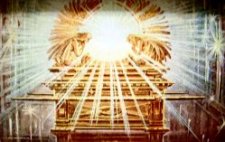 God dwelt in the temple in Jerusalem with His people until just before the Babylonians destroyed the temple in 586 BC. The Prophet Ezekiel was taken off to Babylon in 597 BC, 9 years after Daniel was taken and 11 years before Jerusalem fell in 586 BC. Ezekiel has been prophesying from Babylon about the coming fall of Judah.
God dwelt in the temple in Jerusalem with His people until just before the Babylonians destroyed the temple in 586 BC. The Prophet Ezekiel was taken off to Babylon in 597 BC, 9 years after Daniel was taken and 11 years before Jerusalem fell in 586 BC. Ezekiel has been prophesying from Babylon about the coming fall of Judah.
[Ezekiel 7:1-4] The word of the Lord came to me: 2 “Son of man, this is what the Sovereign Lord says to the land of Israel: “The end! The end has come upon the four corners of the land! 3 The end is now upon you, and I will unleash my anger against you. I will judge you according to your conduct and repay you for all your detestable practices. 4 I will not look on you with pity; I will not spare you. I will surely repay you for your conduct and for the detestable practices among you. “Then you will know that I am the Lord.”
God gave Ezekiel a vision of the Shekinah or Holy Presence of God leaving the temple of Solomon before it was destroyed.
[Ezekiel 10:3-5] 3 Now the cherubim were standing on the south side of the temple when the man went in, and a cloud filled the inner court. 4 Then the glory of the Lord rose from above the cherubim and moved to the threshold of the temple. The cloud filled the temple, and the court was full of the radiance of the glory of the Lord. 5 The sound of the wings of the cherubim could be heard as far away as the outer court, like the voice of God Almighty when he speaks.
[Ezekiel 11:22-25] 22 Then the cherubim, with the wheels beside them, spread their wings, and the glory of the God of Israel was above them. 23 The glory of the Lord went up from within the city and stopped above the mountain east of it. 24 The Spirit lifted me up and brought me to the exiles in Babylonian the vision given by the Spirit of God. Then the vision I had seen went up from me, 25 and I told the exiles everything the Lord had shown me.
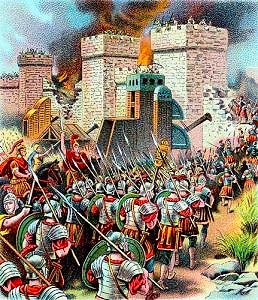
After the 70 years of captivity in Babylon when the remnant of Jews returned to Jerusalem they built another temple called Zerubbabel’s temple. This temple was built about 516 BC. Then many years later when Herod captured Jerusalem for the Romans in about 40 BC, he began a major enlarging and rebuilding of the temple. This temple known as Herod’s temple stood until it was destroyed by the Romans led by Titus in 70 AD. There is no biblical record that the Holy Presence of God came to dwell in either of these temples after the exile. When Israel went into captivity in Babylon, God ceased to dwell with His people. He was no longer their ruler. Israel would be ruled over by other nations from 586 BC until 1948 when they became an independent nation as we discussed in Lesson 6.
According to the prophesies that we will study in the Book of Daniel, the Messiah will rule over Israel once again when He comes back. The following was written by the apostle John describing a vision that God gave him from heaven.


